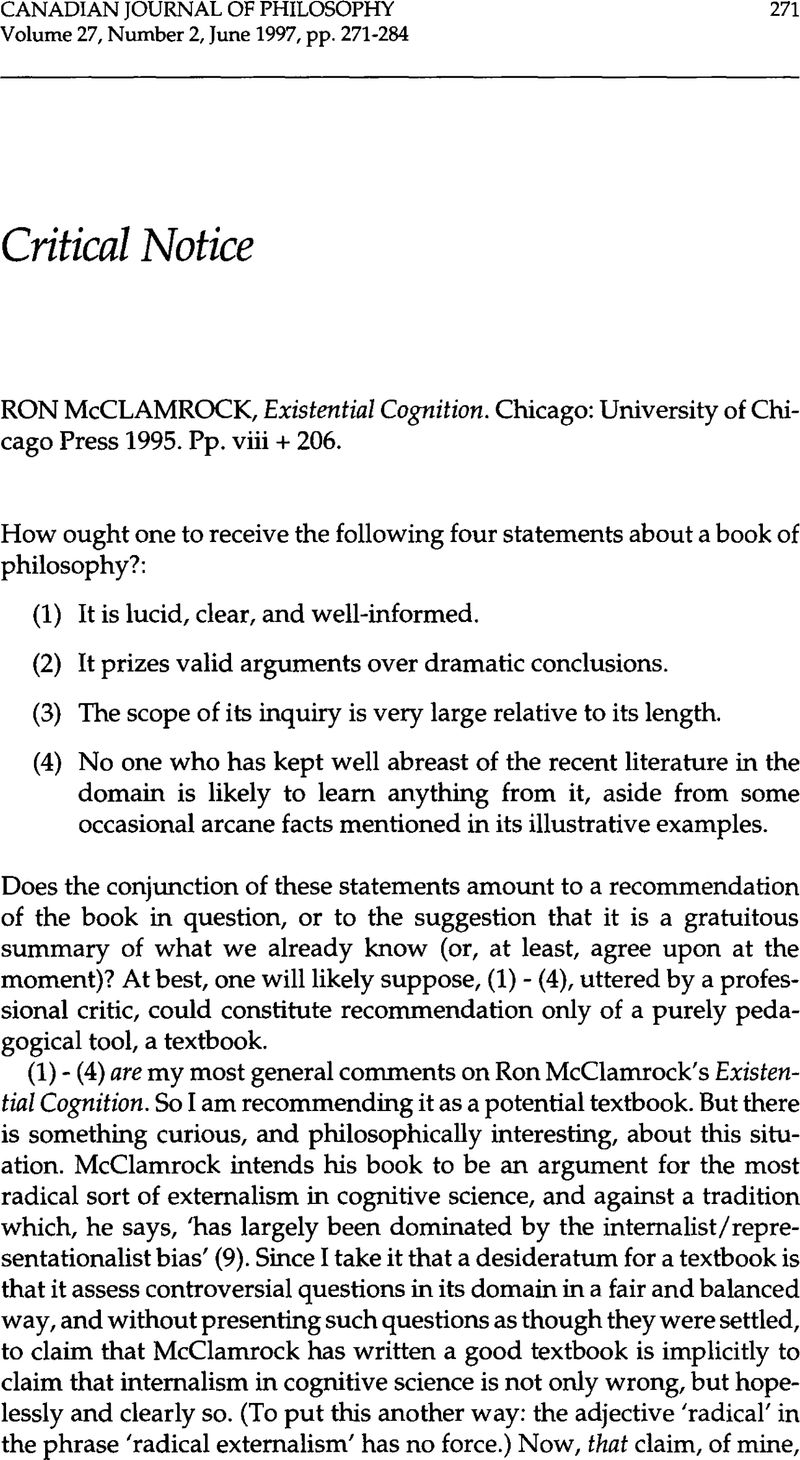No CrossRef data available.
Article contents
Ron McClamrock, Existential Cognition. Chicago: University of Chicago Press 1995. Pp. viii + 206.
Review products
Published online by Cambridge University Press: 01 January 2020
Abstract

- Type
- Critical Notice
- Information
- Copyright
- Copyright © The Authors 1997
References
1 As McClamrock (139) notes, this is even true of Gibson's account of perception, Gibson's own rhetoric to the contrary notwithstanding. Searle, of course, regularly attacks the idea of framing accounts of the mind in information-processing terms, and is therefore correct in his own view of himself as being at odds with the entire enterprise of cognitive science.
2 Simon, H. Administrative Behavior (New York: Macmillan 1957)Google Scholar; Marr, D. Vision (San Francisco: Freeman 1982)Google Scholar; Chomsky, N. Aspects of the Theory of Syntax (Cambridge, MA: The MIT Press 1965)Google Scholar
3 Live critics of functionalism, such as the Churchlands, or a recent incarnation of Putnam, H. (Representation and Reality [Cambridge, MA: The MIT Press 1988])Google Scholar, do not attack functionalism of this bland sort. The Churchlands attack functionalism as conjoined with folk psychology, while Putnam rejects a special variant of functionalism, namely, Turing-machine functionalism. See Ross, D. for a description of a surprisingly strong version of functionalism with which, it is argued, no one presently has grounds for disagreement (‘Minimal Strong Functionalism,’ Journal of Philosophical Research 20 [1995] 237–68)CrossRefGoogle Scholar. Berkeley, I. provides a helpful codicil, situated in the details of current debates in AI, to this argument (‘Connectionism, Tri-Level Functionalism and Causal Roles,’ in O'Nuallain, S. ed., Computation, Cognition and Consciousness [New York: John Benjamins, forthcoming]).Google Scholar
4 The philosophical literature also includes thorough analyses of the relationship between the philosophical presuppositions of Marr's theory and the externalism/ internalism issue, which McClamrock's discussion does not reflect. See Morton, P. ‘Supervenience and Computational Explanation in Vision Theory,’ Philosophy of Science 60 (1993) 86–99CrossRefGoogle Scholar; Egan, F. ‘Individualism, Computation and Perceptual Content,’ Mind 101 (1992) 443–59CrossRefGoogle Scholar, and ‘Individualism and Vision Theory,’ Analysis 54 (1994) 258-64.
5 Later refinements by Chomsky of his own original theory, summarized in Knowledge of Language (New York: Praeger 1986), may be interpreted as a partial retreat from this overidealization.
6 We may, of course, wish for practical purposes to build systems which accomplish hitherto unachieved feats. In such enterprises, we face the need to explain how the task could possibly be performed given some set of environments and time constraints. Here, however, overidealization will be corrected by that most unyielding and reliable of critics, expensive engineering failure.
7 Stillings, N. ‘Modularity and Naturalism in Theories of Vision,’ in Garfield, J. ed., Modularity in Knowledge Representation and Natural-Language Understanding (Cambridge, MA: The MIT Press 1987) 325–32Google Scholar; M. Arbib, ‘Modularity and Interaction of Brain Regions Underlying Visuomotor Coordination,’ in Garfield, ed., 333-63; Ross, D. ‘Against Positing Central Systems in the Mind,’ Philosophy of Science 57 (1990) 297–312CrossRefGoogle Scholar, and Metaphor, Meaning and Cognition (New York: Peter Lang 1993); Dennett, D. Consciousness Explained (Boston, MA: Little, Brown, 1991)Google Scholar; Rummelhart, D. Smolensky, P. McClelland, J. and Hinton, G. ‘Schemata and Sequential Thought Processes in PDP Models,’ in McClelland, J. Rummelhart, D. and the PDP Research Group, eds., Parallel Distributed Processing Vol. 2 (Cambridge, MA: The MIT Press 1986) 7–57CrossRefGoogle Scholar; Karmiloff-Smith, A. Beyond Modularity (Cambridge, MA: The MIT Press 1992)Google Scholar; Clark, A. ‘The Kludge in the Machine,’ Mind and Language 2 (1987) 277–99CrossRefGoogle Scholar
8 I would like to thank Marc Ereshefsky and an anonymous referee for their comments, and, in the second case, bringing to my attention two outright errors, which have since been corrected.




